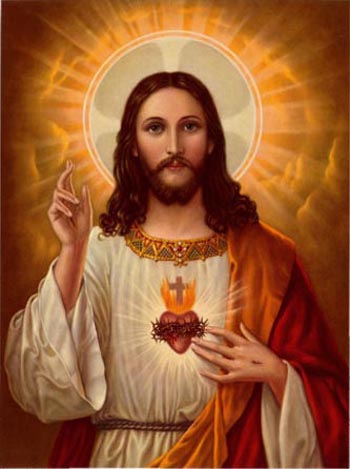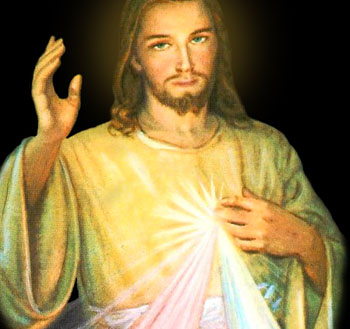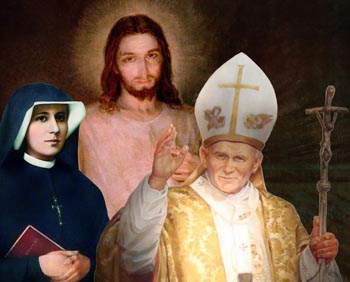Church Reasons to Condemn the
Divine Mercy Devotion
Msgr. Patrick Perez
My dear faithful, today I want to say a few words about the Divine Mercy devotion. I receive many questions about this subject every year and now I want to address the topic. As a source reference I am using principally an issue of
The Angelus magazine (June 2010). This research comes from Fr. Peter Scott. Since he provided most of what I needed for this talk, ‘birettas off’ to Fr. Scott.
The Divine Mercy devotion was re-launched by John Paul II. During his long pontificate he established a feast day in honor of this devotion. During his homily at the canonization of Sr. Faustina on April 30, 2000, he declared that the Second Sunday of Easter would henceforth be called Divine Mercy Sunday.
Consequently, every year on the Sunday following Easter, which is called Low Sunday - in Latin it is called
Dominica in Albis, Sunday in White - I am asked this question, “Father, why don't we celebrate the Divine Mercy Sunday?”

A typical Divine Mercy image remindful of a whirling dervish
Now, the easy answer would be, “We don't do it because it's not in the traditional calendar.” But, then, the feast of Padre Pio also is not in the traditional calendar, but we celebrate it. We do it as prescribed in the Common of the Missal, which allows us to honor recently canonized saints. So, the question returns: Why don’t we celebrate the Divine Mercy Sunday?
I have analyzed the prayers of the Divine Mercy devotion and found nothing wrong with them. But there is something wrong with what surrounds this new devotion.
Let me acknowledge that there are persons, possibly even some persons here, who have received graces from doing the Divine Mercy devotion. That is not an indication that the devotion itself is necessarily from Heaven.
Remember God always answers our prayers. You always receive some grace by your prayers. For example, let’s imagine you made a pilgrimage to visit the burial place of a saint. You made the pilgrimage and thought you were kneeling at the correct grave venerating that saint. In fact, however, he was not buried in that cemetery, but in a church nearby. Nonetheless, God gives you graces because of your effort and your desire to please Him and make reparation for your sins.
You made that pilgrimage; you will not leave it without grace. God does not take a position like, “Well, you're at the wrong grave. Sorry, you travelled 6,000 miles for nothing and now you receive nothing.” No, God will always answer your prayers. So, please, remember when you hear people say, “Well, I have received graces from this devotion.” This in itself is not an indication that the devotion is from Heaven. Certainly the graces are always from Heaven. But the devotion may not be.
Condemnations of this devotion
What is wrong with the Divine Mercy devotion?
First, when this devotion fell under the attention of Pius XII, he was concerned not with the prayers of the devotion, but with the circuмstances of the so-called apparitions to Sr. Faustina and their content. That is, he was concerned with what Our Lord supposedly told Sr. Faustina and what he told her to make public.
Pius XII, then, placed this devotion, including the apparitions and the writings of Sr. Faustina on the
Index Librorum Prohibitorum (Index of Prohibited Books). That list no longer exists, since it was formally abolished on June 14, 1966, by Paul VI. On the one hand, it is unfortunate that it no longer exists. But, on the other hand, if that list were to exist today it would be so vast that it would fill this room. Practically everything that is written today has something objectionable to the Catholic Faith.

JPII supported the thrice-condemned devotion
So, Pius XII put the writings of Sr. Faustina on the
Index of Prohibited Books. That meant that he considered that their content would lead Catholics astray or in the wrong direction.
Next, came other prohibitions made by Pope John XXIII. Twice in his pontificate, the Holy Office issued condemnations of the Divine Mercy writings.
Today the Holy Office is called Congregation for the Doctrine of the Faith. But before it was called the Holy Office of the Inquisition. Its name has changed over several years.
This Office - placed under the direct control of the Pope - is responsible for maintaining the purity of the doctrine and, therefore, it watches over the dissemination of different docuмents in the Church.
If the Pope wants to correct the faithful on a particular topic, he usually does this through the Holy Office. So, the proclamations, declarations and docuмents issued by the Holy Office may be seen as coming from the Pope himself.
Not once, but twice under Pope John XXIII, this particular devotion was condemned through the Holy Office. The first condemnation was in a plenary meeting held on November 19, 1958. The declaration from the Holy Office issued these three statements about this devotion:
1.
There is no evidence of the supernatural origin of these revelations. This means that the members of the Holy Office examined the content and decided that there was nothing there to indicate the apparitions were supernatural. In an authentic apparition - Our Lady of Lourdes or Our Lady of Fatima, for example - you can look at the content and affirm it can not be definitively said they are of divine origin, but there is enough evidence to say that it is possibly so. On the other hand, in the Divine Mercy apparitions, they said definitively that there is no evidence whatsoever that they are supernatural. This translates, “We do not think that these apparitions come from God.”
2.
No feast of Divine Mercy should be instituted. Why? Because if it is based on apparitions that are not clearly coming from God, then it would be rash and temerarious to institute a feast in the Church based on something that is a false apparition.
3.
It is forbidden to disseminate writings propagating this devotion under the form received by Sr. Faustina, as well as the image typical of it. So, it was forbidden to even publish the image of Our Lord as Divine Mercy.
Now, you have all seen this image, even if in passing, and you would know and recognize it. It shows a strange picture of Jesus that makes me uneasy. I cannot really tell you why. I do not like it. I don't like the face, I don't like the gesture, I don't like the posture, I don't like anything. This was my first impression of this image. I don't want it around because it is, for lack of a better term, creepy to me when I look at it.
The image shows multicolored rays, I think they are red, white and blue, coming from His chest region - no heart, just these rays. You have all seen this. Well, that was the image that was forbidden to be published or spread.
On March 6, 1959, the Holy Office issued a second decree on the order of Pope John XXIII. It forbade, once again, spreading the images of Divine Mercy and the writings of Sr. Faustina propagating this devotion. It also stated that it was up to the bishops to decide how they were going to remove the images that had already been displayed for public honor.
I do not need to say much more about these declarations. Two Popes strongly warned the faithful of a danger in this devotion. Pius XII put it on the
Index; John XXIII issued two condemnations through the Holy Office about the spiritual danger this devotion presented to the faithful. Not much more needs to be said on that.
Principal error: It presents an unconditional mercy
Let me present you with a parallel thought.
 Above
Above, a majestic Jesus with the halo of divinity and a well-defined Sacred Heart gives a clear blessing;
below, a worker-like Jesus without the proper halo or a heart makes a gesture more like a "hello" than a blessing

Consider the true image of Christ Our Savior. Probably the most symbolically rich and accurate representation of Him, besides the Crucifix, is the image of the Sacred Heart, because the image of Our Lord with the Sacred Heart summarizes the whole theology of Redemption.
They pierced His Hands, His Feet and His Sacred Heart; the crown of thorns encircles the Heart, which burns with love for man. This was the price He paid, the sacrifice He made for our redemption. He offered Himself because of His burning love for us despite the fact we are ungrateful creatures who rebelled against our Creator. Think about it. He created us and then we nailed Him to a cross even though He was God and completely innocent of any guilt. So, the Sacred Heart encapsulates all this.
In the images of the Sacred Heart, He points to this symbolic font of love and mercy for us. The devotions to the Sacred Heart always suppose reparation for our sins. We are sinners, we must make reparation. Despite the promises from Our Lord and the fact that He paid an infinite price for our Redemption, we must make reparation. We should always do penance for our sins and make various kinds of reparation.
Now, consider the image of Our Lord representing the Divine Mercy. It is an imitation of the Sacred Heart without the heart. When you pay attention, you notice that in the image there is no heart. There are simply rays coming out of a point above His waist. This symbolizes the error of the Divine Mercy devotion. It preaches that we can expect an unconditional mercy with no price to be paid whatsoever, with no obligations whatsoever. This is not the message of Christ.
Christ is merciful. Time and time again, His mercy pardons our repeated sins in the Sacrament of Penance, always taking us back no matter how bad our sins are. And what happens in the Sacrament of Penance? The very name of the Sacrament tells us exactly what happens: to be effective the Sacrament supposes penance. Not only are you there at the Sacrament recognizing your full submission to the Church and your dependence on the Sacraments for forgiveness, but you walk out of the confessional with an imposed penance.
You are also often reminded from this pulpit that you must not only fulfill that penance, but you must continually do penance, your own penance. You don't just say a decade of the Rosary and say, “Well, I've done my penance. Now, I can go merrily on my way.” You must always have the spirit of penance for your past sins; you must live with it.
The central error of the Divine Mercy is that it promises lots of spiritual rewards with no requirement of penance, no mention of reparation, no mention of any condition.
Unfortunately, this corresponds very much with what Pope John Paul II wrote in the Encyclical
Dives in misericordia. I do not recommend reading it to any of you, except the most prepared, because it has many misleading things. It re-echoes this mercy with no price, gifts from heaven with no requirements, God's mercy with no mention of penance or reparation for sin whatsoever.
Anticipating that encyclical Pope John Paul II already in 1978, the very first year of his pontificate, set in motion the canonization of Sr. Faustina and the institution of a Divine Mercy Sunday feast. As I said before, both Sr. Faustina’s writings and the very idea of having a Divine Mercy feast day had been prohibited and condemned by two previous Popes.
Presumption in Sr. Faustina’s writings
The writings of the Polish Sr. Faustina herself, published in English in 2007, pose cause for concern. The work has 640 pages and transcribes frequent supposed apparitions and messages from Our Lord.

A new "save-yourself-without-effort" devotion
This long thread of statements supposedly from Our Lord to Sr. Faustina has some things that would make a correct-thinking Catholic very uneasy, to say the least. I will exemplify by taking a few quotes from her writings.
On October 2, 1936, she states that the “Lord Jesus” appeared to her and said, “Now, I know that it is not for the graces or gifts that you love Me, but because My Will is dearer to you than life. That is why I am uniting Myself with you so intimately as with no other creature.” (
Divine Mercy in My Soul, The Diary of Sr. Faustina, Stockbridge, MA: Marian Press, 1987, p. 288)
How can we believe that Our Lord has united Himself more intimately with Sr. Faustina than with the Blessed Virgin Mary? At first, we might read this and think, “Oh, that's beautiful.“ But later it may hit you, “Wait a minute, Our Lord united Himself more intimately with Sr. Faustina than with any other creature? Our Lady was the Immaculate Conception, but she was also His creature, she was created by Him as the rest of us were, albeit with the greatest exalted position free from original sin from the very beginning.”
And now are we expected to believe that Our Lord told Sr. Faustina that He is more united to her than anybody else, even the Blessed Virgin Mary, and certainly more than all the other Saints? This affirmation smacks of pride in itself, let alone the assertion that it came from Heaven.
This type of presumption is present in many other cases.
Our Lord supposedly addressed Sr. Faustina on May 23, 1937, with these words: “Beloved pearl of My Heart.” What bothers me about this is that it is pure saccharin. Look how Our Lady speaks to Sr. Lucia or to St. Bernadette. It is not as “beloved pearl of My Heart.” It is impossible to imagine Our Lord stooping to saccharin language. Our Lord is Christ the King, Creator of the universe, and ruler of all that is. He does not say things like “beloved pearl of My Heart.”
Let me continue. Then, He said: “I see your love so pure; purer than that of the angels, and all the more so because you keep fighting. For your sake, I bless the world.” (
ibid., p. 400) First of all, except for the Blessed Virgin Mary, we are not free from original sin and, therefore, we are not capable of a love purer than the angels.

nαzι soldiers invaded Poland after Sr. Faustina announced a blessed world -
above, they are marching on Warsaw
As for blessing the world, that might be fine. If we had one real saint in the world, then the Lord will give us blessings for that one real saint. This is not my objection.
My objection is that this revelation was in 1937; the world was on the verge of World War II, which Sr. Lucy had already been forewarned of by Our Lady at Fatima: if Russia is not consecrated, and man does not convert, then this big disaster will befall mankind for their evil ways and their sins.
At that moment, we were about to see that disaster descend from Heaven, yet Our Lord tells Sr. Faustina, “For your sake, I am going to bless the world.” Was World War II a blessing on the world? Since her native Poland did not go unscathed by the German invasion, it does not seem likely that He actually blessed the world.
Another example: Sr. Faustina claimed that Our Lord told her that she was exempt from judgment, every judgment - particular judgment and the general judgment. On February 4, 1935, she already claimed to hear this voice in her soul, “From today on, do not fear God’s judgment, for you will not be judged.” (
ibid., p. 168)
Now, nobody but the Blessed Virgin, as far as I know, is free from the general and particular judgment. St. Thomas Aquinas, according to the pious story, had to genuflect in Purgatory before going to Heaven. I don’t know if this is fact, but it is a lesson for us that nobody is exempt from any kind of judgment.
And add to these examples the preposterous affirmation that the Host jumped out of the Tabernacle three times and placed itself in her hands, so that she had to open up the Tabernacle and place it back herself: “And the host came out of the Tabernacle and came to rest in my hands and I, with joy, placed it back in the Tabernacle. This was repeated a second time, and I did the same thing. Despite this, it happened a third time.” (
ibid., p. 23) It makes it sound like a hamster that has gotten out of its cage. “Oh, no, here it is again. I have to go put this back now.”
How many times has the Church declared that the hands of a priest are consecrated to handle the Sacred Species, and what kind of lesson would you be giving to the world by this example of the Host leaping into her hands so that she had to place it back in the Tabernacle herself?
Our Lord does not contradict His Church by word or by gesture. And this would be a little bit by both. She related what happened, but the gesture itself would be Our Lord contradicting the Real Presence and everything it represents.
A lack of Catholic spirit
In short, the whole Divine Mercy devotion does not represent a Catholic spirit. The Catholic spirit is one of making constant reparation in penance for our sins, of praying for the graces of God, for the mercy of God in this life.
Let me close by saying that it is the background of this devotion that is questionable. You do not just institute a particular devotion with its own feast day based on something that has been condemned for very good reasons in the recent past.
When you look at the prayers of the Divine Mercy devotions, they are perfectly orthodox. There is nothing heretical or presumptuous in these prayers. But just remember the reason why it has been condemned and why we do not recognize Divine Mercy Sunday is because of its past, not because of the content of the prayers.
It is very important to know this, because it is one of many things that were brought back in modern times that were condemned in the past. And this is not a case of the Church changing her mind. It is a case of a representative of the Church doing something he should not be doing.